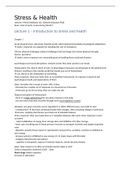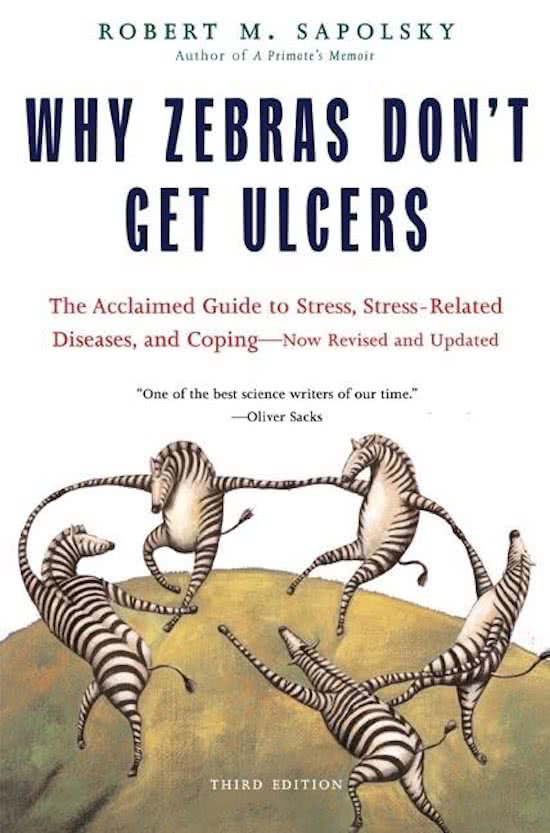Stress & Health
Lecturer: Mirela Habibovic (Dr. Stefanie Duijndam PhD)
Exam: start of April, no proctoring (06.04?)
Lecture 1 – Introduction to stress and health
Chapter 1
Acute physical crises: extremely stressful events which demand immediate physiological adaptations.
body’s responses are adapted for handling this sort of emergency
Chronic physical challenges: physical challenges that last longer but remain physical (drought,
famine, parasites)
body’s stress-responses are reasonably good at handling these sustained disasters
psychological and social disruptions: stressful events that exists purely in our heads
Homeostasis: the state in which all sorts of physiological measures are being kept at the optimal level
Stressor: anything in the outside world that knocks you out of homeostasis
can also be in the anticipation of something
Stress-response: what your body does to re-establish homeostasis, in response to physical and
psychological insults and expectations of them
Selye: formalize the concept of stress with 2 ideas
- the body has a similar set of responses to a broad array of stressors
- if stressors go on for too long, they can make you sick
Original conception of homeostasis
- there is a single optimal level for any given measure in the body
- you can reach that ideal set point through some local regulatory system
allostasis: any given set point can be regulated in a zillion different ways, each with its own
- consequences the brain coordinates body-wide changes, often including changes in behaviour
stressor: anything that throws your body out of allostatic balance
Stress response: what your body does to re-establish allostasis (the same stress response in each
occasion)
- rapid mobilization of energy from storage sites and inhibition of further storage,
- heart rate, breathing rate & blood pressure increase to transport nutrients and oxygen at greater
rates
- digestion, growth (tissue repair) & reproduction (sexual drive, ovulation, erection) is inhibited to
save energy
- immune system is inhibited to save energy (ch. 8: major issues with this idea)
- analgesia (blunted pain perception)
- cognition is sharpened: aspects of memory improve, senses become sharper
Selye: false answer to Q: Why can stressful events make us sick?
General adaptation syndrome (GAS) – Selye
Alarm stage (initial response)
Increase of adrenaline
,Increase in energy
Fight or flight
Symptoms: energy
Resistance stage (on guard)
Increase of cortisol
Repair
Dealing with stress if not possible to repair
It may look like you are coping with stress
Symptoms: irritability, frustration, poor concentration
Exhaustion stage (low ability)
In case of prolonged stress, damage to body
Giving up on fighting stress
Symptoms: fatigue, burnout, anxiety/depression
Selye:
- stress is a physiological response
- non-specific response of the body to any need or threat
FALSE: not the stress-response that runs out but the stress-response becomes more damaging
than the stressor itself (especially when the stress is purely psychological)
Reactivity hypothesis:
stress response is activated just before the stressor, at highest point during the stressor, and when
stressor decreases the physiological response also decreases recover to your baseline
stress response is always adaptive
BUT stress response varies between individuals and within individuals (time)
- failure to adapt to chronic stress suggests psychological not physiological exhaustion.
Prolonged activation model:
A stressor will only affect our health when the physiological effect is prolonged (e.g. occurring long
before the stressor or recovers slowly).
Michigan stress model:
Not only the objective stressor and our subjective
perception of it decide whether it will have an
effect on our health or not but also our
personality, social support, reaction to the
stressor.
Stress response is not purely physiological
not everybody has the same stress response
the stress response and its duration is different between and within persons
The cycle of stress: psycho biological response to stress
- resting ground phase
- tension phase
- response phase
- relief phase
Measuring frequency, duration and intensity
, SHORT TERM Long Term
Positive Increased immunoprotection Suppress auto immune disease systems (suppressive
functioning of immune system) If you have auto-
immune disease the symptoms decrease
Enhance mental and physical performance
NEGATI Emotional level: negative mood Health/ disease: cardiovascular, auto-immune, cancer
VE
Cognitive level: concentration, memory
Behavioural level: smoking, alcohol, drugs
Biological level: Immune, endocrine
Is stress always a bad thing?
There are times when stress is effective: body signals that you are in danger/something is not okay
and you need to take action that you have to change this
Adaptive Disruptive
Acute Chronic
Short duration Long duration
Fast recovery Slow recovery
Preparing the body for danger Preparing the body for??
Signalling danger Signalling what??
Early onset (anticipate stress way before the
stressor is going to happen)
Stress response activation
Anything that disrupts the homeostasis
- adaptive or anticipated (necessary: prepares you to combat, unnecessary: prepares you for nothing)
- acute (short term) or chronic (long term). Can both have negative and positive effects
-Individual differences in stress response: (response stereotypy)
Stress perception, processing, appraisal, coping, genetic make-up
-Situational differences (situational stereotypy)
Situations elicit different biological response
Not al stressors produce the same stress response
Hormonal signature for particular stressor
Body sensitivity to stress hormones
Psychological context: how we see situation and how we see our coping mechanisms
Why stress-response itself becomes harmful
- if you constantly mobilize energy you will fatigue more quickly, risk of diabetes
- chronically activating cardiovascular system leads to cardiovascular damages
- if you turn of long term building nothing is repaired and growth inhibition can lead to stress
dwarfism in kids and brittle bones in adulthood
- suppressing immune function for too long and too much you are at risk to infectious diseases and
less capable of fighting the once you have them
- brain systems can be damaged by hormones secreted during stress in the long run.
, Chapter 2 – Glands, gooseflesh and hormones
Somatic nervous system: voluntary
autonomous system: less to no voluntary control (but
control: potty training, repressing burps)
- sympathetic nervous system: activated in response to
stress
* epinephrine: secreted as a result of the sympathetic
nerve endings in adrenal glands
* norepinephrine: secreted by all other sympathetic
nerve endings throughout the body
- parasympathetic nervous system: suppressed in
response to stress; activated when we are resting,
restoring.
Neurotransmitter: a chemical messenger that causes a
close cell to do something, in a short period of time
Hormone: a messenger that moves into the bloodstream and affects events far and
wide.
The brain (hypothalamus) releases both releasing and inhibiting hormones which
instruct the pituitary, which in turn regulates the peripheral glands.
Hormones of the stress response
- epinephrine
- norepinephrine
- glucocorticoids: steroid hormones secreted by the adrenal gland and often act in
ways similarly to epinephrine (only over a longer time duration)
- glucagon: raises circulating levels of glucose (together with glucocorticoids and
sympathetic nervous system), secreted by pancreas energy mobilization
- prolactin: plays a role in suppressing reproduction during stress (pituitary)
- antidiuretic hormone (vasopressin): plays a role in the cardiovascular stress response
blood pressure goes up during stress (pituitary)
- endorphins and enkephalins: help blunt pain perception (pituitary + brain)
Inhibited hormones during stress
- reproductive hormones: oestrogen/testosterone
- growth hormones: insulin (insulin is about storing energy)
Stressor CHR (corticotroping releasing hormone) by hypothalamus ACTH (corticotropin) by
pituitary glucocorticoid release by adrenal gland.
The stress response is about preparing the body for a major expenditure of energy
Fight or flight Tend and befriend
Male reaction Female reaction
More aggression Taking care/seeking social affiliation
SNS, glucocorticoids etc. Oxytocine
Taylor: physiology of the stress-response is different in females than in males
males: fight or flight
females: tend or befriend: taking care of young and seeking social affiliation





